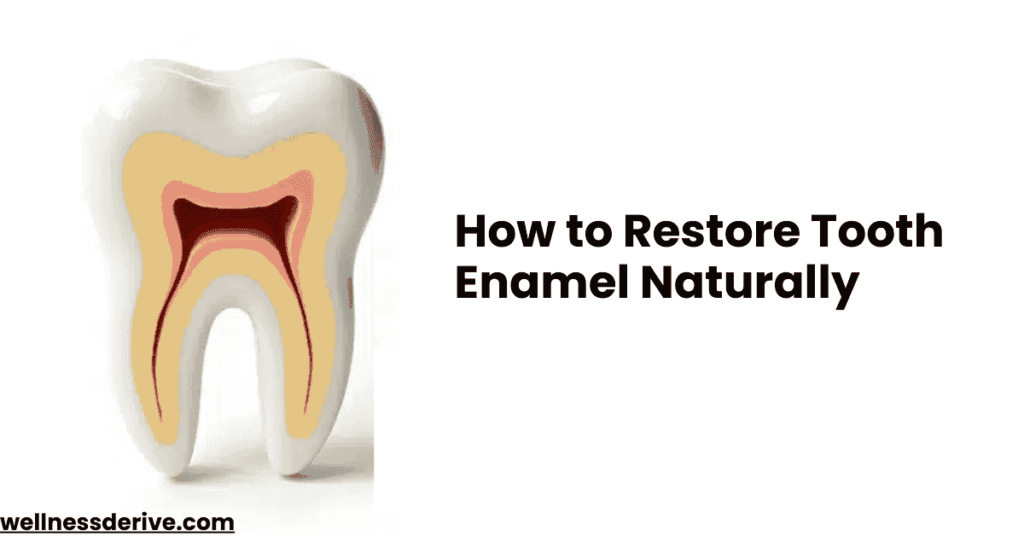Tooth enamel is the hard outer layer of your teeth that protects them from damage, decay, and sensitivity. It serves as a shield against bacteria, acids, and temperature changes, keeping your teeth strong and healthy. However, unlike other parts of your body, enamel cannot regenerate because it does not contain living cells. Once it is lost due to erosion, it cannot grow back.
The good news is that while completely lost enamel cannot be restored, you can strengthen, repair, and remineralize weakened enamel naturally. This guide will cover the causes of enamel erosion, how to rebuild enamel strength naturally, and the best ways to maintain healthy teeth long-term.
Also Read: Why Does My Tooth Filling Hurt After Months?
What Causes Enamel Erosion?
Several factors contribute to the wear and weakening of tooth enamel over time. The most common causes include:
Acidic Foods and Drinks
Consuming excessive amounts of acidic foods such as citrus fruits, soda, wine, and coffee can slowly break down enamel, making your teeth more sensitive.
Poor Oral Hygiene
Not brushing and flossing regularly allows plaque and harmful bacteria to accumulate, which can lead to enamel erosion and cavities.
Excessive Sugar and Starch Intake
Sugary foods and refined carbohydrates promote the growth of acid-producing bacteria, which can weaken enamel over time.
Teeth Grinding (Bruxism)
Grinding or clenching your teeth, often during sleep, wears down the enamel, leading to increased sensitivity and tooth damage.
Dry Mouth (Low Saliva Production)
Saliva plays a crucial role in neutralizing acids and remineralizing enamel. A lack of saliva, often caused by dehydration, stress, or medication, increases the risk of enamel erosion.
Also Read: Cavity on Side of Tooth: Causes, Symptoms, and Treatment
How to Restore Tooth Enamel Naturally

While enamel cannot regrow, you can take natural steps to strengthen and protect it. Here’s how you can rebuild enamel naturally and prevent further damage.
1. Eat Enamel-Strengthening Foods
A nutrient-rich diet is essential for keeping your teeth strong and promoting natural remineralization. Foods high in calcium, phosphorus, and vitamins help repair weakened enamel.
Best Foods for Enamel Strength:
- Dairy products (milk, cheese, yogurt) – Rich in calcium and phosphates that help remineralize enamel.
- Leafy greens (spinach, kale, broccoli) – High in calcium and essential minerals.
- Nuts and seeds (almonds, walnuts, sesame seeds) – Contain nutrients that strengthen teeth.
- Fatty fish (salmon, mackerel, sardines) – High in vitamin D and phosphorus, which aid in calcium absorption.
- Crisp vegetables and fruits (carrots, celery, apples) – Help increase saliva production and naturally clean teeth.
2. Use Fluoride for Natural Enamel Protection
Fluoride is a key mineral that helps remineralize and strengthen tooth enamel. It can be found in fluoride toothpaste, mouthwash, and drinking water.
To maximize enamel protection:
- Brush with fluoride toothpaste twice a day.
- Drink fluoridated water to strengthen teeth naturally.
- Use a fluoride mouth rinse to help repair weak enamel.
3. Practice Proper Oral Hygiene
Good oral hygiene prevents plaque buildup, bacteria growth, and enamel erosion. A consistent routine helps maintain strong, healthy teeth.
- Brush gently with a soft-bristled toothbrush to avoid excessive enamel wear.
- Floss daily to remove food particles and plaque between teeth.
- Use a fluoride mouthwash to enhance remineralization.
- Wait 30 minutes after eating acidic foods before brushing to prevent damage.
4. Reduce Acidic and Sugary Foods
Acidic and sugary foods are among the biggest culprits of enamel erosion. Reducing their consumption can help protect your teeth.
Limit:
- Citrus fruits (oranges, lemons, grapefruit) – Consume in moderation and rinse your mouth with water afterward.
- Soft drinks, energy drinks, and coffee – These beverages contain high acid levels that weaken enamel.
- Sugary snacks and candies – Feed harmful bacteria in the mouth, increasing acid production.
What to do instead:
- Drink water or milk instead of acidic drinks.
- Use a straw for acidic beverages to minimize contact with teeth.
- Rinse your mouth with water after consuming acidic foods.
5. Increase Saliva Production for Natural Remineralization
Saliva is essential for neutralizing acids and protecting enamel. If you suffer from dry mouth, try the following:
- Drink more water throughout the day.
- Chew sugar-free gum to stimulate saliva flow.
- Eat crunchy vegetables and fruits like apples, celery, and carrots.
- Avoid alcohol-based mouthwashes, which can dry out the mouth.
6. Use Natural Enamel-Repairing Remedies
There are several natural methods to strengthen enamel and support oral health.
- Coconut oil pulling – Swishing coconut oil for 10-15 minutes may help reduce bacteria and plaque buildup.
- Eggshell powder – Rich in calcium, it can be used as a natural enamel-supporting supplement.
- Hydroxyapatite toothpaste – A fluoride alternative that helps remineralize weakened enamel.
Also Read: Can You Kill Tooth Pain Nerve in 3 Seconds Permanently?
The Role of Calcium and Vitamin D in Enamel Health
Calcium and vitamin D are essential nutrients for maintaining strong teeth and supporting enamel remineralization.
- Calcium helps build and maintain the mineral content of enamel.
- Vitamin D enhances calcium absorption, ensuring your body uses it effectively.
Dairy products, leafy greens, and fortified foods provide calcium, while vitamin D can be obtained from sunlight, fatty fish, and supplements if needed.
Can Tooth Enamel Be Restored Completely?
Tooth enamel cannot regenerate, but with the right approach, it can be strengthened and remineralized. If severe enamel loss occurs, your dentist may recommend bonding, veneers, or dental crowns to protect your teeth.
For minor enamel erosion, following a nutrient-rich diet, fluoride treatments, and proper oral care can help preserve and rebuild enamel naturally.
Should You Use Enamel-Repairing Toothpaste?
Yes, using toothpaste designed to repair and strengthen enamel can be very effective. Look for toothpaste containing:
- Fluoride – Helps remineralize enamel and prevent decay
- Hydroxyapatite – A natural mineral that binds to teeth and fills in microscopic holes
- Calcium phosphates – Support mineral restoration in weakened enamel
These toothpastes are safe for daily use and are especially beneficial for people with sensitive or weakened teeth.
FAQs About Restoring Tooth Enamel Naturally
Conclusion
If you’re wondering how to restore tooth enamel naturally, the key lies in strengthening and remineralizing your teeth through proper nutrition, oral hygiene, and smart lifestyle choices. While lost enamel cannot be regrown, you can protect and reinforce it by eating a calcium-rich diet, using fluoride products, and avoiding acidic foods.
By following these natural enamel-repairing methods, you can maintain strong, healthy teeth and prevent future damage. If you notice severe enamel erosion or sensitivity, consult a dentist for professional treatment options. With the right care, your smile can remain bright, strong, and cavity-free for years to come!
Disclaimer: The content on Wellness Derive is for informational purposes only and not a substitute for professional medical advice, diagnosis, or treatment. Always consult a healthcare provider for medical concerns.



